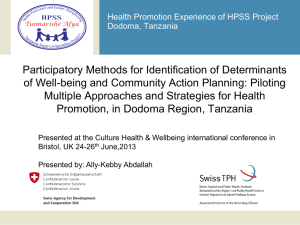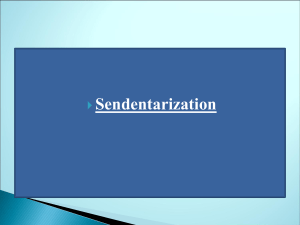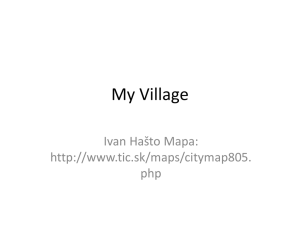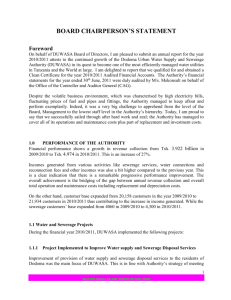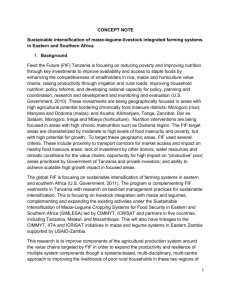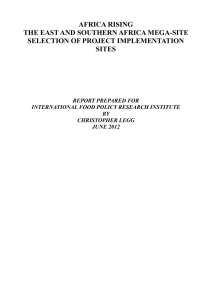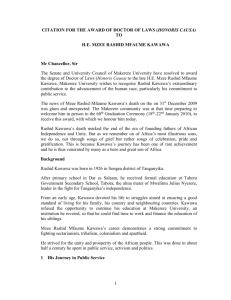Chololo launch briefing
advertisement
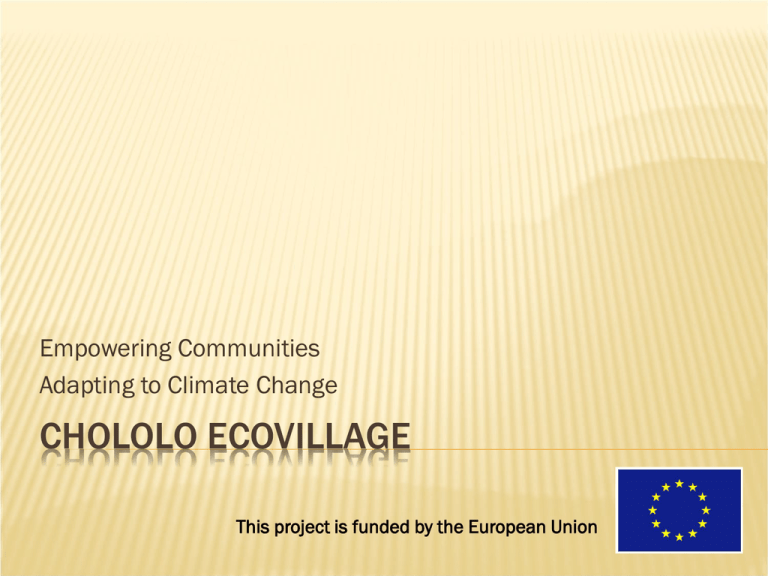
Empowering Communities Adapting to Climate Change CHOLOLO ECOVILLAGE This project is funded by the European Union PROJECT TITLE Empowering Vulnerable Rural Communities to Adapt and Mitigate the Impacts of Climate Change in Central Tanzania This project is funded by the European Union AIM To strengthen capacity of vulnerable rural communities to adapt to climate change for improved livelihoods and natural resource management. This project is funded by the European Union OBJECTIVES To transform Chololo into a thriving eco-village – a model of good practice in climate change adaptation and mitigation; To identify, test, evaluate and share innovative adaptation technologies and approaches; To support the village community to agree and implement land use plans and natural resource management practices; To empower women to act at the forefront of the transformation, with increased authority and reduced workload; To increase household food security and incomes, and improve livelihoods. This project is funded by the European Union ORIGINS Global Climate Change Alliance (GCCA) National Adaptation Programme of Action (NAPA) Climate Vulnerability and Capacity Analysis (CVCA) Opportunities and Obstacles to Development (O&OD) This project is funded by the European Union CHOLOLO CLIMATE CHANGE EFFECTS Drought – rain season starts later, finishes earlier, less predictable, hence change in crop calendar, crop losses, low agricultural productivity, lowered incomes, food shortage and recurrent famine strike; Deforestation - loss of vegetation, increased desertification, reduced animal forage/pasture, shortage of fuel wood and timber, increased women’s workload, increased land pressure due to poor natural resource management (NRM); Flooding and strong winds – leading to soil erosion, crop losses, land degradation, and declining soil fertility; Human diseases: skin diseases, cholera and diarrhoea; Livestock diseases/crop pests: e.g. Rift Valley Fever, army worm, calidea bugs, stink bugs; Inadequate ground water recharge, lowering water table, increased salinity, leading to shortage of drinking water for domestic use and livestock, and low availability/poor quality of water for crop production This project is funded by the European Union COMMUNITY COPING STRATEGIES Current coping strategy Effectiveness Chololo pits used to retain soil moisture Very little Analysis Poorly spaced and filled. Application of FYM Very little FYM not applied correctly Early maturing / drought resistant varieties Some how. Good number of farmers practice Can build on this. Livestock fodder conservation for dry season Very little Limited application Moving livestock elsewhere – to other villages Very little Limited application Deepening hand dug wells Short term only as water table keeps dropping Need aquifer monitoring / recharge Fetching water from next village (3 km) It is highly practiced Unsustainable 2hrs round trip. Forest conservation bye laws Bye-laws not enforced. Lack of community control of nat res. This project is funded by the European Union NUMBERS 3500 people in 922 households TZS 1.4bn (89% EU, 11% local partners) 26 months 6 delivery partners 20+ innovative technologies This project is funded by the European Union DELIVERY PARTNERS Institute of Rural Development Planning Dodoma Municipal Council Agricultural Research Institute Hombolo Maji na Maendeleo (MAMADO) Tanzania Organic Agriculture Movement (TOAM) Dodoma Environmental Network (DONET) This project is funded by the European Union AGRICULTURE INNOVATIONS Cropping systems / conservation agriculture Community seed production Tillage innovations for soil water conservation Ox weeder & Ox carts Development of subsectors that benefit women, e.g. Chicken, Groundnuts, Hibiscus Crop / livestock interaction Low carbon economy development This project is funded by the European Union LIVESTOCK INNOVATIONS Improved cattle breeds – Mpwapwa bulls Improved goat breeds – for meat and milk Improved chicken farming – for women Animal disease control Dry season feeding Improved pasture / browsing Watermelon This project is funded by the European Union NATURAL RESOURCES INNOVATIONS Afforestation Tree nurseries Womens groups / eco-school woodlots Agroforestry Village land use planning Energy saving stoves Biogas This project is funded by the European Union WATER INNOVATIONS Aquifer monitoring Borehole repair Rainwater harvesting – roof catchment 600m2 Sand dam for aquifer recharge Sub surface dam for water storage Integrated water resource management This project is funded by the European Union MULTIPLIER EFFECT Farmer field schools Study visits Technology Transfer Fund Publications National and Local Media Video – documenting the process Website and social media This project is funded by the European Union PROJECT DELIVERY TIMETABLE Awaiting funds Delivery so far Remaining project period This project is funded by the European Union PROGRESS TO DATE Introduction of project to district and village authorities Introduction of project to village community Introduction of project to each sub village community Formation of village project committee Survey of crops & livestock Formation of sub village participant groups Formation of innovation groups Identification and demarcation of demo plots Began construction of school roof catchment Began construction of village office This project is funded by the European Union LIVESTOCK SURVEY 800 700 600 Ng'ombe 500 Maksai 400 Mbuzi 300 Kuku 200 100 0 KAWAWA SIASA KIZOTA MUUNGANO LUSINDE JAMHURI This project is funded by the European Union CROP SURVEY 400 350 300 KAWAWA 250 SIASA KIZOTA 200 MUUNGANO 150 LUSINDE 100 JAMHURI 50 0 Mtama Uwele Karanga Alizeti Kunde Choya This project is funded by the European Union INNOVATION GROUPS Chicken Male goats Bulls Concervation agric & cropping Agronomic practices/use of FYM Chololo Pits SWC Innovations / Ox-weeder Community Seed production 0 10 20 30 40 This project is funded by the European Union 50 PARTICIPANT GENDER BALANCE Lusinde Siasa Female Kawawa Male Muungano Jamhuri 0 2 4 6 8 10 12 14 16 18 This project is funded by the European Union 20 PARTICIPANT GENDER BALANCE Male Female This project is funded by the European Union WITH MANY THANKS TO ALL THOSE WHO MADE THIS POSSIBLE, INCLUDING: His Excellency Tim Clarke, EU Ambassador The Delegation of European Union to Tanzania The Ministry of Finance Regional Commissioner, Dodoma Regional Administrative Officer, Dodoma District Commissioner, Dodoma Town Hon. David Malole MP, Dodoma Town Dodoma Municipal Director Mayor, Dodoma Municipality Representative, The Division of the Environment, VPO Constantine Lifuliro, Rector, Institute of Rural Development Planning Government Officials & NGO Representatives This project is funded by the European Union





